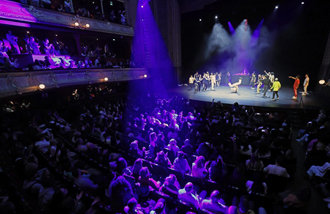Economy Taking Toll on Restaurants
Shin Sang-ho (a made-up name, 60) who is running restaurant A in a university town in Gangbuk, Seoul, left his home at 5:30 a.m. on July 21 to select food ingredients for a day at a market which starts at 6:00 a.m.. At least, two or three years ago, going to market early in the morning was fun, but these days, it isnt. said Shin.
He opened his restaurant in 1992, recorded 1.3 million won of daily sales and 38,630,000 won in monthly sales on average in 2000. He bought a building with a floor space of 90 pyeong which he had rented with his savings and loaned money.
Mr. Shin said, At the time, I had enough money left to bring home even after giving payroll to my employees, spending money in tax, public charges and buying ingredients.
However, his sales started to decrease beginning the second half of last year.
His restaurants average sales a month was 33,480,000 won during the first half of this year. To simply compare the sales, they fell by 5,150,000 won compared to 2000.
However, he said he could not help but just sigh when looking at the details.
He said he was able to maintain that level of sales because food prices have doubled. Sirloin beef for one person, which was priced at 14,000 won in 2000, sells for 27,000 won now.
Above all, his income has dropped and tax burdens have soared.
He cut two employees, but he has to pay 11,300,000 won for wages every month. The figure is much higher than 10,500,000 won in 2000 when he employed ten workers. Average wage a person has increased from 1,050,000 won to 1,410,000 won.
As for taxes, he paid seven million won for income tax and VAT in 2000, but spent 17 million won last year. The increase in credit card sales and the introduction of a cash receipt system played a role.
He said, Im spending half of sales on ingredients as their prices have gone up significantly. I have only five million won a year left as a net profit after paying salary, taxes and interest on loaned money from my current income.
Mr. Shin pointed a finger at the economic slowdown as a culprit for reduced sales. He said, compared to six years ago, the number of customers has reduced in half and they spend 10,000-20,000 won from 20,000-30,000 won per person on average.
He confessed that there are many friends who ended their business as the restaurant business environment deteriorated.
According to the Korea Restaurant Association, 242 restaurants opened and 367 restaurants were closed in a district where restaurant A is located in the first half of this year. It is the first time that closed restaurants outnumbered opening ones.
Everybody says that it is harder to live than during the financial crisis. They say we should return a restaurant permit and hold a demonstration. I feel really angry at the government which only says they will make a plan to support the self-employed, but they are just raising tax burden in actuality and dont listen to difficulties.







